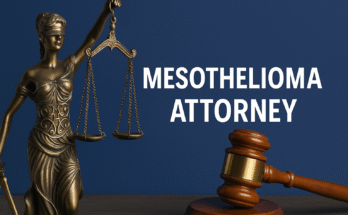Motorcycle Injury Attorney Tips: Your Guide After a Crash in the US
Being involved in a motorcycle accident in the United States can be a terrifying and life-altering experience. Unlike drivers or passengers in cars, motorcyclists have little to no physical protection, making them highly susceptible to severe injuries. Beyond the immediate physical trauma, victims often face mounting medical bills, lost wages, and the daunting task of navigating complex legal and insurance systems. This is precisely where the strategic guidance of an experienced motorcycle injury attorney becomes not just beneficial, but absolutely essential.
In the US, motorcycle accidents often carry a unique set of challenges. There’s a pervasive, and often unfair, bias against motorcyclists, leading some jurors and even insurance adjusters to assume the rider was at fault. This preconception, combined with the often catastrophic nature of motorcycle injuries, makes securing fair compensation a complex endeavor. Common injuries sustained by motorcyclists include:
- Road Rash: Severe skin abrasions that can lead to infection, permanent scarring, and nerve damage.
- Fractures and Broken Bones: High-impact collisions frequently result in multiple fractures in limbs, ribs, and the pelvis, often requiring extensive surgery and rehabilitation.
- Traumatic Brain Injuries (TBIs): Even with a helmet, the force of impact can cause concussions, contusions, or more severe brain damage, leading to long-term cognitive, emotional, and physical impairments.
- Spinal Cord Injuries: Impacts to the back or neck can result in devastating spinal cord damage, potentially leading to partial or complete paralysis.
- Internal Injuries: Blunt force trauma can cause internal bleeding, organ damage (spleen, liver, kidneys), and other life-threatening conditions that may not be immediately apparent.
- “Biker’s Arm”: Nerve damage to the arm or shoulder, often occurring when a rider extends their arm to brace for impact, leading to chronic pain and loss of function.
- Psychological Trauma: Beyond physical wounds, many riders experience post-traumatic stress disorder (PTSD), anxiety, depression, and a fear of riding again.
Given the potential severity of these injuries and their profound impact on a victim’s life, securing adequate compensation is paramount. Here are essential tips from a US motorcycle injury attorney to guide you after a crash:
1. Prioritize Safety and Seek Immediate Medical Attention
Your health and well-being are the absolute priority.
- At the Scene: If conscious and able, immediately assess yourself and others for injuries. If anyone is seriously hurt, unconscious, or bleeding profusely, call 911 (emergency services) without delay. Do not attempt to move anyone with suspected head, neck, or spinal injuries unless they are in immediate danger (e.g., from fire or traffic).
- Get Examined: Even if you feel fine or your injuries seem minor, seek a medical evaluation immediately. Adrenaline can mask pain, and some severe injuries (like internal bleeding or concussions) may not present symptoms for hours or even days. A prompt medical record from soon after the accident is irrefutable evidence linking your injuries to the crash, which is crucial for any legal claim. Follow all doctor’s orders, attend all follow-up appointments, and keep meticulous records of all medical bills, prescriptions, and therapy sessions.
2. Secure the Scene and Gather Evidence
What you do at the accident site can significantly impact the strength of your claim.
- Move to Safety (If Possible): If your motorcycle is safely movable and you are not severely injured, move it and yourself to the side of the road to prevent further accidents. However, if you suspect serious injuries or if moving the bike would compromise evidence, leave it in place until law enforcement arrives.
- Call the Police: Always report the accident to law enforcement. An official police report provides an objective account of the accident, identifies involved parties, and may assign fault. Cooperate fully with the officers but avoid admitting fault, apologizing, or speculating about what happened. Stick to the facts.
- Gather Information:
- Other Parties: Collect the name, contact number, insurance information (company and policy number), vehicle make, model, license plate number, and driver’s license number of all other drivers involved.
- Witnesses: Ask anyone who saw the accident for their name and contact information. Independent witness testimonies can be invaluable, especially if there are conflicting accounts.
- Photographs and Videos: Use your smartphone to take extensive photos and videos of the accident scene from various angles. Capture damage to all vehicles (yours and others’), skid marks, road conditions, traffic signals or signs, weather conditions, debris on the road, and any visible injuries you or others sustained. The more visual evidence, the better.
- Do NOT Admit Fault: This cannot be stressed enough. Any statement, even a casual “I’m so sorry,” can be misconstrued and used against you by insurance companies.
3. Understand Your Rights and Insurance Realities
Motorcycle insurance laws and requirements vary by state, and understanding your coverage and the other driver’s is critical.
- Notify Your Insurer: Report the accident to your own motorcycle insurance provider as soon as reasonably possible. Be concise with the facts and avoid speculation.
- Beware of Other Drivers’ Insurers: The at-fault driver’s insurance company will likely contact you quickly. Their goal is to settle your claim for the lowest possible amount. Do NOT give a recorded statement or sign any documents (especially medical releases or settlement offers) without first consulting your attorney. You are not obligated to speak with them without legal representation.
- Underinsured/Uninsured Motorist (UM/UIM) Coverage: Many motorcycle accidents involve drivers who are uninsured or underinsured. Having UM/UIM coverage on your own policy is crucial protection that can cover your damages in such scenarios. Your attorney will help you navigate this claim if applicable.
4. Consult a Motorcycle Injury Attorney Immediately
This is arguably the most critical step after ensuring your safety and documenting the scene.
- Early Engagement: Do not delay. The sooner an attorney is involved, the better they can gather perishable evidence (e.g., security camera footage that might be erased, witness memories that fade), interview witnesses, and ensure all legal deadlines (statutes of limitations) are met. These deadlines vary by state and are typically strict, often ranging from one to four years from the date of the accident.
- Specialized Knowledge: A lawyer specializing in motorcycle accidents understands the unique legal challenges and biases faced by riders. They know how to counter negative stereotypes and present you as a responsible victim.
- Evidence Collection & Preservation: Your attorney will handle all aspects of evidence collection, including obtaining police reports, medical records, surveillance footage, and expert witness testimonies (e.g., accident reconstructionists, medical experts).
- Negotiation & Representation: Your lawyer will handle all communications with insurance companies, aggressively negotiate on your behalf for a fair settlement, and prepare to take your case to court if a satisfactory agreement cannot be reached. They will fight for comprehensive compensation covering:
- Past and future medical expenses (including rehabilitation, ongoing therapy, and long-term care).
- Lost wages (current and future earning capacity).
- Pain and suffering.
- Emotional distress.
- Loss of enjoyment of life.
- Property damage (for your motorcycle and gear).
- Contingency Fee Basis: Most reputable motorcycle accident attorneys work on a contingency fee basis. This means you pay no upfront legal fees. Their payment is a percentage of the compensation they secure for you. This model makes quality legal representation accessible to all victims, regardless of their current financial situation.
Conclusion
A motorcycle accident is a traumatic event, but it doesn’t have to define your future. By taking swift action to secure your safety, meticulously document the scene, and, most importantly, engaging a dedicated US motorcycle injury attorney, you empower yourself to navigate the complexities of the legal system. Your attorney will serve as your advocate, protecting your rights, battling against biases, and fighting for the full and fair compensation you deserve, allowing you to focus on your recovery and rebuilding your life after the crash.



